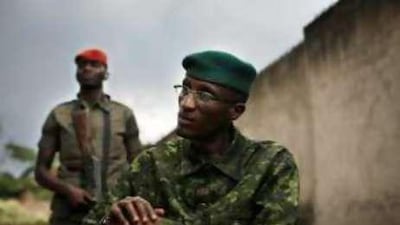BUNAGANA, DR CONGO // Laurent Nkunda has the upper hand, and he knows it. In the past three months, Mr Nkunda's well-trained militia has routed the much larger Congolese army and taken hundreds of kilometres of territory seemingly at will. His military gains have translated into political muscle. This month, the government sat down to bilateral negotiations for the first time with Mr Nkunda's National Congress for the Defence of the People (CNDP) in Nairobi, the Kenyan capital. The talks, mediated by Olusegun Obasanjo, the UN envoy and former Nigerian president, are aimed at bringing peace to eastern Democratic Republic of Congo, a region that has been embroiled in nearly constant fighting for 10 years. But Mr Nkunda wants to broaden the dialogue to include all of the DRC, which he says is racked by bad governance. Mr Nkunda has nothing to lose from the negotiations. He confidently struts around his headquarters in crisp, green fatigues clutching his cane, which is topped with a silver eagle's head. If the peace talks fail, Mr Nkunda said, he will again flex his military might. "If Kinshasa doesn't want to talk, we will overthrow the government," Mr Nkunda said in an interview from his base in the green hills near the Ugandan border. "We have the power to do so." A report last week from a UN panel of experts presented compelling evidence that the CNDP is backed by the government of Rwanda, Congo's small but influential neighbour. Rwanda and Mr Nkunda both deny this, but if it were true, it would explain Mr Nkunda's swagger. In 1996, Rwanda supported Laurent Kabila, a warlord who launched a rebellion in eastern Congo and marched across the country to Kinshasa, toppling the dictator Mobutu Sese Seko and installing himself as president. His son, Joseph Kabila, became president when Laurent was assassinated in 2001. The peace talks between Mr Kabila's government and Mr Nkunda's CNDP are already floundering. The two sides could not agree on a renewed ceasefire on Sunday. The talks resumed this week only after a week-long suspension was called because the government accused the CNDP of having too broad an agenda. Mr Nkunda began his rebellion to protect his ethnic Tutsi people, who have been attacked by Hutus that fled Rwanda after that country's 1994 genocide. But recently Mr Nkunda's rhetoric has focused on national issues beyond the eastern region. "I am a Congolese. I am fighting for changes for all of Congo," Mr Nkunda said. "For us, we are dealing with a national problem. The constitution is violated by the president. There is no law, no normalcy." Experts say Mr Nkunda's carefully cultivated image as protector of the people is an excuse to continue his armed rebellion. His real aims are political power and a share of Congo's vast mineral wealth, they say. "They are talking about the big issues, but we want to talk about the war," said Endada Kisangani, a government official who is participating in the Nairobi talks. "They want to talk on behalf of all the opposition. For them to get into government, that is impossible." Since the recent fighting began in August, 250,000 people have fled their homes, according to the United Nations. It says almost one million people have been displaced since the war began. The conflict has caused a humanitarian disaster in the region. The CNDP has been accused of human rights atrocities including recruiting child soldiers, raping and looting. A recent Human Rights Watch report said CNDP forces massacred 150 civilians in a village in November. Mr Nkunda denies these accusations. "What I know is that it is not true," he said of the human rights violations, adding that the villagers killed in November were mostly members of a local militia called the Mai Mai that had attacked CNDP. While the government and CNDP delegations continue to negotiate in Nairobi, their forces have respected a fragile ceasefire, allowing for much-needed humanitarian aid to reach those displaced near the front line. UN officials are hopeful that these talks will succeed where other peace processes have failed. "For us, this is a positive step because of what you see on the ground. The situation on the ground is calm," said Jean Jacques Simon, a spokesman for the UN mission in the DRC. "In our situation, we have to be optimistic. There is no other way." Although the fighting has stopped for now, the front line, about 15 kilometres outside the regional capital Goma, remains tense. Government soldiers are entrenched in their positions behind makeshift walls of lava rocks. It is a similar scene just 500 metres to the north, where CNDP rebels have their guns trained on government forces. Both sides are ready in case the talks break down. "We are just here waiting," said Richard Tiama, a government army commander on the front lines. "When the talks fail, we will begin fighting again." mbrown@thenational.ae

Rebel chief talks peace but ready for war
The Congolese warlord Laurent Nkunda warns that if talks breakdown with the government his militia will resume fighting.
Most popular today
